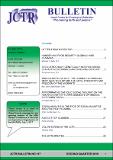JCTR Bulletin 2nd Quarter 2019
Date
20192019
Authors
Jesuit Centre for Theological Reflection
Jesuit Centre for Theological Reflection
Type
BulletinLanguage
enItem Usage Stats
54
views
views
13
downloads
downloads
Abstract
Like in our previous issue of JCTR Bulletin, we are once again blessed with articles traversing a wide range of issues. We encourage JCTR readers to take time to read all seven articles presented in this issue of JCTR Bulletin. They are all loaded with very enriching and stimulating ideas. We take liberty to share some highlights of three of the articles in this issue of JCTR Bulletin to whet your appetite to read all the articles from cover to cove Like in our previous issue of JCTR Bulletin, we are once again blessed with articles traversing a wide range of issues. We encourage JCTR readers to take time to read all seven articles presented in this issue of JCTR Bulletin. They are all loaded with very enriching and stimulating ideas. We take liberty to share some highlights of three of the articles in this issue of JCTR Bulletin to whet your appetite to read all the articles from cover to cove
Description
Like in our previous issue of JCTR Bulletin, we are once again blessed with articles traversing a wide range of issues. We encourage JCTR readers to take time to read all seven articles presented in this issue of JCTR Bulletin. They are all loaded with very enriching and stimulating ideas. We take liberty to share some highlights of three of the articles in this issue of JCTR Bulletin to whet your appetite to read all the articles from cover to cover.
The first article by Fr. Michael Kelly, S.J. addresses the issue of hunger and food security. The author challenges us to find creative and ethically correct ways of responding to the food and nutrition needs of hungry people across the world. Faced with the growing numbers of people who go to bed hungry each night, each country is called to make food security a dominant national priority in order to give our brothers and sisters who are hungry something to eat.
The second article by Temple Anuforo, S.J. addresses the issue of genetically modified seeds. He exposes the folly of the pro-GMO camp who argue that given the changes in the world, there is no way to assure food security and a robust agricultural economy without turning to bio-technology. He does not only underscore the importance of precautionary principle advanced by the anti-GMO camp, which argues that in the face of uncertainty about a biological technology, it is better to err on the side of caution, but he also goes further to make a case that GMO seeds in themselves, even if they were not biologically toxic, still embody a form of extractive and unjust agricultural economics that denies farmers and the general population of the inherent rights to seed varieties.
The author argues that GMO seeds do not solve the problem of providing for the growing population because GMO technologies do not preclude creation of an extractive economy around seeds, which in itself is reprehensible as it lacks moral, scientific and economic standing. The argument states that seed is not a commodity; it is an integral ecological or covenant good. Like air and water, seed is a shared “democratic commons” or “covenant good” of human beings, which cannot be privatized without concomitantly creating situations of injustice, poverty and even slavery.
The third article by Bro. Jithin Jose Kalan, CMI, addresses the issue of migration. He argues that migration is an ageless human reality that could be defined as a natural behaviour of human beings. Migration is an unavoidable phenomenon in the contemporary world, and it has been part and parcel of the society we live in. The number of people who can no longer live in their homeland for political, social, economic and religious reasons is increasing. Given that Christianity itself has its root in a migrant background (the story of Abraham, Israel, and of Jesus), it follows that as Christians we must have concern for immigrants and refugees. The experiences of immigrants and refugees, especially their experiences of loneliness and despair present us with an opportunity to witness our faith in a very concrete way in the manner that we treat and relate with our brothers and sisters who are immigrants and refugees.
